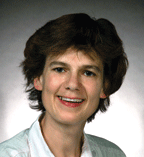Mathematical foundations of cryptography

As part of the Centre for Applied Cryptographic Research and in the course of her own work, Edlyn looks at the development of cryptographic schemes, makes theoretical approximations of their efficiency and applies them to explicit ranges of numbers. She explains, “We will look at an algorithm to see if it makes sense or examine an attack on a system. Our consulting with industry and government lets us apply the theory to practical situations.”
Increasing computing power also leads to more efficient factoring (the widely known RSA cryptosystem is based on the hardness of integer factorization). New methods, new schemes, or increased parameters to maintain security are required. “Two large numbers (RSA200 and RSA640) have been factored recently. New ideas like pairing-based cryptography are being developed. It’s an exciting time,” says Edlyn. ”And it’s a good excuse to learn some more number theory.”
University of Waterloo Mathematics, Annual Report 2005